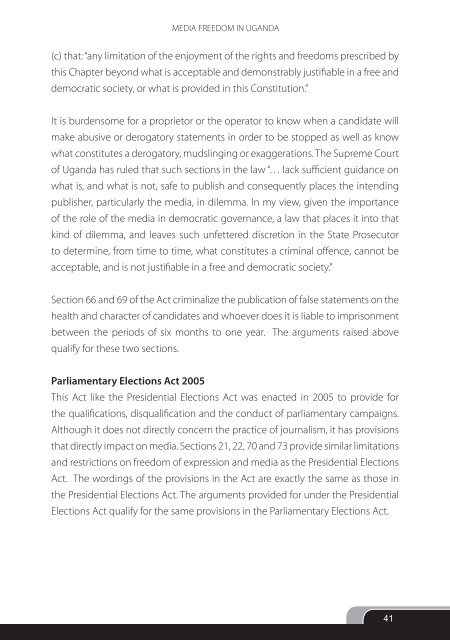Media_Freedom_in_Uganda_Analysis_of_inequitable_legal_limitations
Media_Freedom_in_Uganda_Analysis_of_inequitable_legal_limitations
Media_Freedom_in_Uganda_Analysis_of_inequitable_legal_limitations
Create successful ePaper yourself
Turn your PDF publications into a flip-book with our unique Google optimized e-Paper software.
MEDIA FREEDOM IN UGANDA<br />
(c) that: “any limitation <strong>of</strong> the enjoyment <strong>of</strong> the rights and freedoms prescribed by<br />
this Chapter beyond what is acceptable and demonstrably justifiable <strong>in</strong> a free and<br />
democratic society, or what is provided <strong>in</strong> this Constitution.”<br />
It is burdensome for a proprietor or the operator to know when a candidate will<br />
make abusive or derogatory statements <strong>in</strong> order to be stopped as well as know<br />
what constitutes a derogatory, mudsl<strong>in</strong>g<strong>in</strong>g or exaggerations. The Supreme Court<br />
<strong>of</strong> <strong>Uganda</strong> has ruled that such sections <strong>in</strong> the law “… lack sufficient guidance on<br />
what is, and what is not, safe to publish and consequently places the <strong>in</strong>tend<strong>in</strong>g<br />
publisher, particularly the media, <strong>in</strong> dilemma. In my view, given the importance<br />
<strong>of</strong> the role <strong>of</strong> the media <strong>in</strong> democratic governance, a law that places it <strong>in</strong>to that<br />
k<strong>in</strong>d <strong>of</strong> dilemma, and leaves such unfettered discretion <strong>in</strong> the State Prosecutor<br />
to determ<strong>in</strong>e, from time to time, what constitutes a crim<strong>in</strong>al <strong>of</strong>fence, cannot be<br />
acceptable, and is not justifiable <strong>in</strong> a free and democratic society.”<br />
Section 66 and 69 <strong>of</strong> the Act crim<strong>in</strong>alize the publication <strong>of</strong> false statements on the<br />
health and character <strong>of</strong> candidates and whoever does it is liable to imprisonment<br />
between the periods <strong>of</strong> six months to one year. The arguments raised above<br />
qualify for these two sections.<br />
Parliamentary Elections Act 2005<br />
This Act like the Presidential Elections Act was enacted <strong>in</strong> 2005 to provide for<br />
the qualifications, disqualification and the conduct <strong>of</strong> parliamentary campaigns.<br />
Although it does not directly concern the practice <strong>of</strong> journalism, it has provisions<br />
that directly impact on media. Sections 21, 22, 70 and 73 provide similar <strong>limitations</strong><br />
and restrictions on freedom <strong>of</strong> expression and media as the Presidential Elections<br />
Act. The word<strong>in</strong>gs <strong>of</strong> the provisions <strong>in</strong> the Act are exactly the same as those <strong>in</strong><br />
the Presidential Elections Act. The arguments provided for under the Presidential<br />
Elections Act qualify for the same provisions <strong>in</strong> the Parliamentary Elections Act.<br />
41


